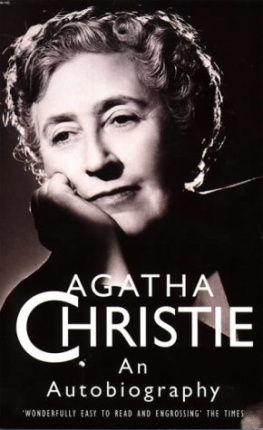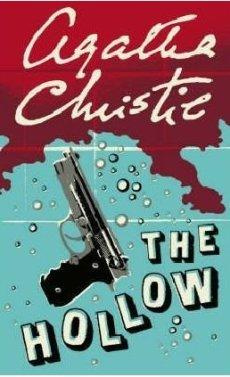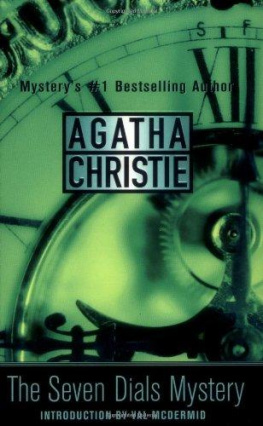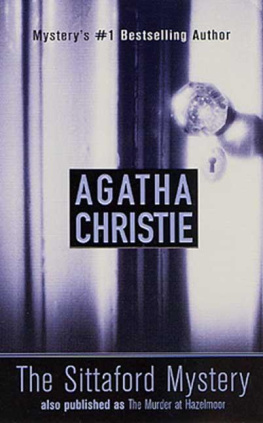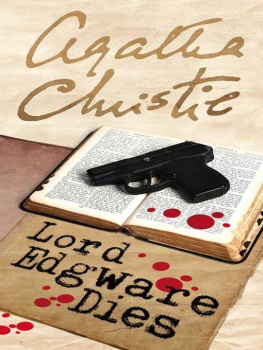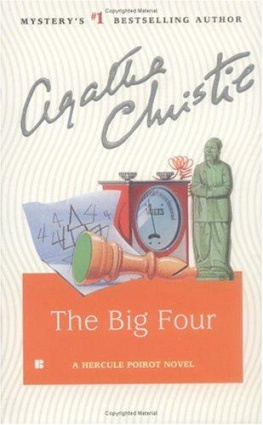Agatha Christie - The Thirteen Problems
Here you can read online Agatha Christie - The Thirteen Problems full text of the book (entire story) in english for free. Download pdf and epub, get meaning, cover and reviews about this ebook. year: 2004, publisher: HarperCollins, genre: Art. Description of the work, (preface) as well as reviews are available. Best literature library LitArk.com created for fans of good reading and offers a wide selection of genres:
Romance novel
Science fiction
Adventure
Detective
Science
History
Home and family
Prose
Art
Politics
Computer
Non-fiction
Religion
Business
Children
Humor
Choose a favorite category and find really read worthwhile books. Enjoy immersion in the world of imagination, feel the emotions of the characters or learn something new for yourself, make an fascinating discovery.

- Book:The Thirteen Problems
- Author:
- Publisher:HarperCollins
- Genre:
- Year:2004
- Rating:5 / 5
- Favourites:Add to favourites
- Your mark:
- 100
- 1
- 2
- 3
- 4
- 5
The Thirteen Problems: summary, description and annotation
We offer to read an annotation, description, summary or preface (depends on what the author of the book "The Thirteen Problems" wrote himself). If you haven't found the necessary information about the book — write in the comments, we will try to find it.
The Thirteen Problems — read online for free the complete book (whole text) full work
Below is the text of the book, divided by pages. System saving the place of the last page read, allows you to conveniently read the book "The Thirteen Problems" online for free, without having to search again every time where you left off. Put a bookmark, and you can go to the page where you finished reading at any time.
Font size:
Interval:
Bookmark:


To Leonard and Katherine Woolley
Unsolved mysteries.
Raymond West blew out a cloud of smoke and repeated the words with a kind of deliberate self-conscious pleasure.
Unsolved mysteries.
He looked round him with satisfaction. The room was an old one with broad black beams across the ceiling and it was furnished with good old furniture that belonged to it. Hence Raymond Wests approving glance. By profession he was a writer and he liked the atmosphere to be flawless. His Aunt Janes house always pleased him as the right setting for her personality. He looked across the hearth to where she sat erect in the big grandfather chair. Miss Marple wore a black brocade dress, very much pinched in round the waist. Mechlin lace was arranged in a cascade down the front of the bodice. She had on black lace mittens, and a black lace cap surmounted the piled-up masses of her snowy hair. She was knittingsomething white and soft and fleecy. Her faded blue eyes, benignant and kindly, surveyed her nephew and her nephews guests with gentle pleasure. They rested first on Raymond himself, self-consciously debonair, then on Joyce Lemprire, the artist, with her close-cropped black head and queer hazel-green eyes, then on that well-groomed man of the world, Sir Henry Clithering. There were two other people in the room, Dr Pender, the elderly clergyman of the parish, and Mr Petherick, the solicitor, a dried-up little man with eyeglasses which he looked over and not through. Miss Marple gave a brief moment of attention to all these people and returned to her knitting with a gentle smile upon her lips.
Mr Petherick gave the dry little cough with which he usually prefaced his remarks.
What is that you say, Raymond? Unsolved mysteries? Haand what about them?
Nothing about them, said Joyce Lemprire. Raymond just likes the sound of the words and of himself saying them.
Raymond West threw her a glance of reproach at which she threw back her head and laughed.
He is a humbug, isnt he, Miss Marple? she demanded. You know that, I am sure.
Miss Marple smiled gently at her but made no reply.
Life itself is an unsolved mystery, said the clergyman gravely.
Raymond sat up in his chair and flung away his cigarette with an impulsive gesture.
Thats not what I mean. I was not talking philosophy, he said. I was thinking of actual bare prosaic facts, things that have happened and that no one has ever explained.
I know just the sort of thing you mean, dear, said Miss Marple. For instance Mrs Carruthers had a very strange experience yesterday morning. She bought two gills of picked shrimps at Elliots. She called at two other shops and when she got home she found she had not got the shrimps with her. She went back to the two shops she had visited but these shrimps had completely disappeared. Now that seems to me very remarkable.
A very fishy story, said Sir Henry Clithering gravely.
There are, of course, all kinds of possible explanations, said Miss Marple, her cheeks growing slightly pinker with excitement. For instance, somebody else
My dear Aunt, said Raymond West with some amusement, I didnt mean that sort of village incident. I was thinking of murders and disappearancesthe kind of thing that Sir Henry could tell us about by the hour if he liked.
But I never talk shop, said Sir Henry modestly. No, I never talk shop.
Sir Henry Clithering had been until lately Commissioner of Scotland Yard.
I suppose there are a lot of murders and things that never are solved by the police, said Joyce Lemprire.
That is an admitted fact, I believe, said Mr Petherick.
I wonder, said Raymond West, what class of brain really succeeds best in unravelling a mystery? One always feels that the average police detective must be hampered by lack of imagination.
That is the laymans point of view, said Sir Henry dryly.
You really want a committee, said Joyce, smiling. For psychology and imagination go to the writer
She made an ironical bow to Raymond but he remained serious.
The art of writing gives one an insight into human nature, he said gravely. One sees, perhaps, motives that the ordinary person would pass by.
I know, dear, said Miss Marple, that your books are very clever. But do you think that people are really so unpleasant as you make them out to be?
My dear Aunt, said Raymond gently, keep your beliefs. Heaven forbid that I should in any way shatter them.
I mean, said Miss Marple, puckering her brow a little as she counted the stitches in her knitting, that so many people seem to me not to be either bad or good, but simply, you know, very silly.
Mr Petherick gave his dry little cough again.
Dont you think, Raymond, he said, that you attach too much weight to imagination? Imagination is a very dangerous thing, as we lawyers know only too well. To be able to sift evidence impartially, to take the facts and look at them as factsthat seems to me the only logical method of arriving at the truth. I may add that in my experience it is the only one that succeeds.
Bah! cried Joyce, flinging back her black head indignantly. I bet I could beat you all at this game. I am not only a womanand say what you like, women have an intuition that is denied to menI am an artist as well. I see things that you dont. And then, too, as an artist I have knocked about among all sorts and conditions of people. I know life as darling Miss Marple here cannot possibly know it.
I dont know about that, dear, said Miss Marple. Very painful and distressing things happen in villages sometimes.
May I speak? said Dr Pender smiling. It is the fashion nowadays to decry the clergy, I know, but we hear things, we know a side of human character which is a sealed book to the outside world.
Well, said Joyce, it seems to me we are a pretty representative gathering. How would it be if we formed a Club? What is today? Tuesday? We will call it The Tuesday Night Club. It is to meet every week, and each member in turn has to propound a problem. Some mystery of which they have personal knowledge, and to which, of course, they know the answer. Let me see, how many are we? One, two, three, four, five. We ought really to be six.
You have forgotten me, dear, said Miss Marple, smiling brightly.
Joyce was slightly taken aback, but she concealed the fact quickly.
That would be lovely, Miss Marple, she said. I didnt think you would care to play.
I think it would be very intersting, said Miss Marple, especially with so many clever gentlemen present. I am afraid I am not clever myself, but living all these years in St Mary Mead does give one an insight into human nature.
I am sure your co-operation will be very valuable, said Sir Henry, courteously.
Who is going to start? said Joyce.
I think there is no doubt as to that, said Dr Pender, when we have the great good fortune to have such a distinguished man as Sir Henry staying with us
He left his sentence unfinished, making a courtly bow in the direction of Sir Henry.
The latter was silent for a minute or two. At last he sighed and recrossed his legs and began:
It is a little difficult for me to select just the kind of thing you want, but I think, as it happens, I know of an instance which fits these conditions very aptly. You may have seen some mention of the case in the papers of a year ago. It was laid aside at the time as an unsolved mystery, but, as it happens, the solution came into my hands not very many days ago.
Font size:
Interval:
Bookmark:
Similar books «The Thirteen Problems»
Look at similar books to The Thirteen Problems. We have selected literature similar in name and meaning in the hope of providing readers with more options to find new, interesting, not yet read works.
Discussion, reviews of the book The Thirteen Problems and just readers' own opinions. Leave your comments, write what you think about the work, its meaning or the main characters. Specify what exactly you liked and what you didn't like, and why you think so.

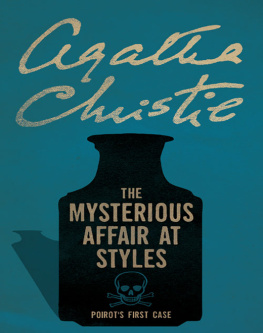
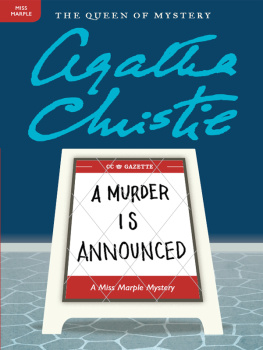
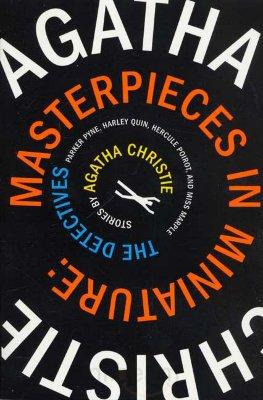
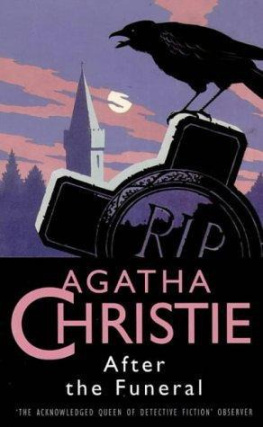
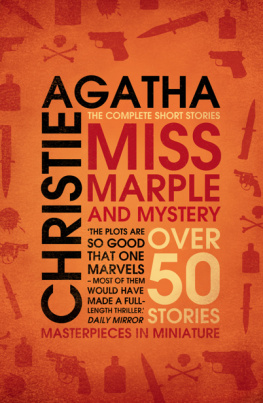
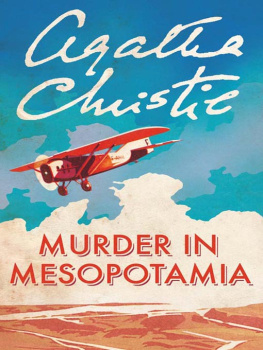
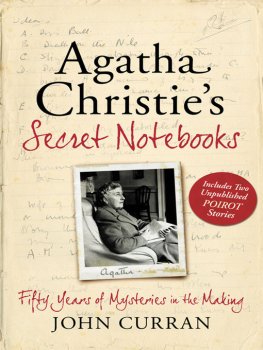
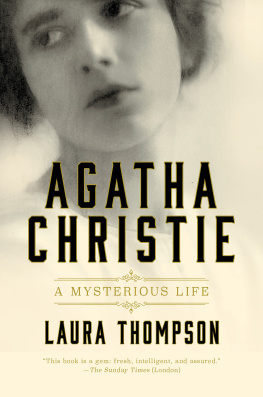

![Agatha Christie [Agatha Christie] - Problem at Pollensa Bay](/uploads/posts/book/140367/thumbs/agatha-christie-agatha-christie-problem-at.jpg)
